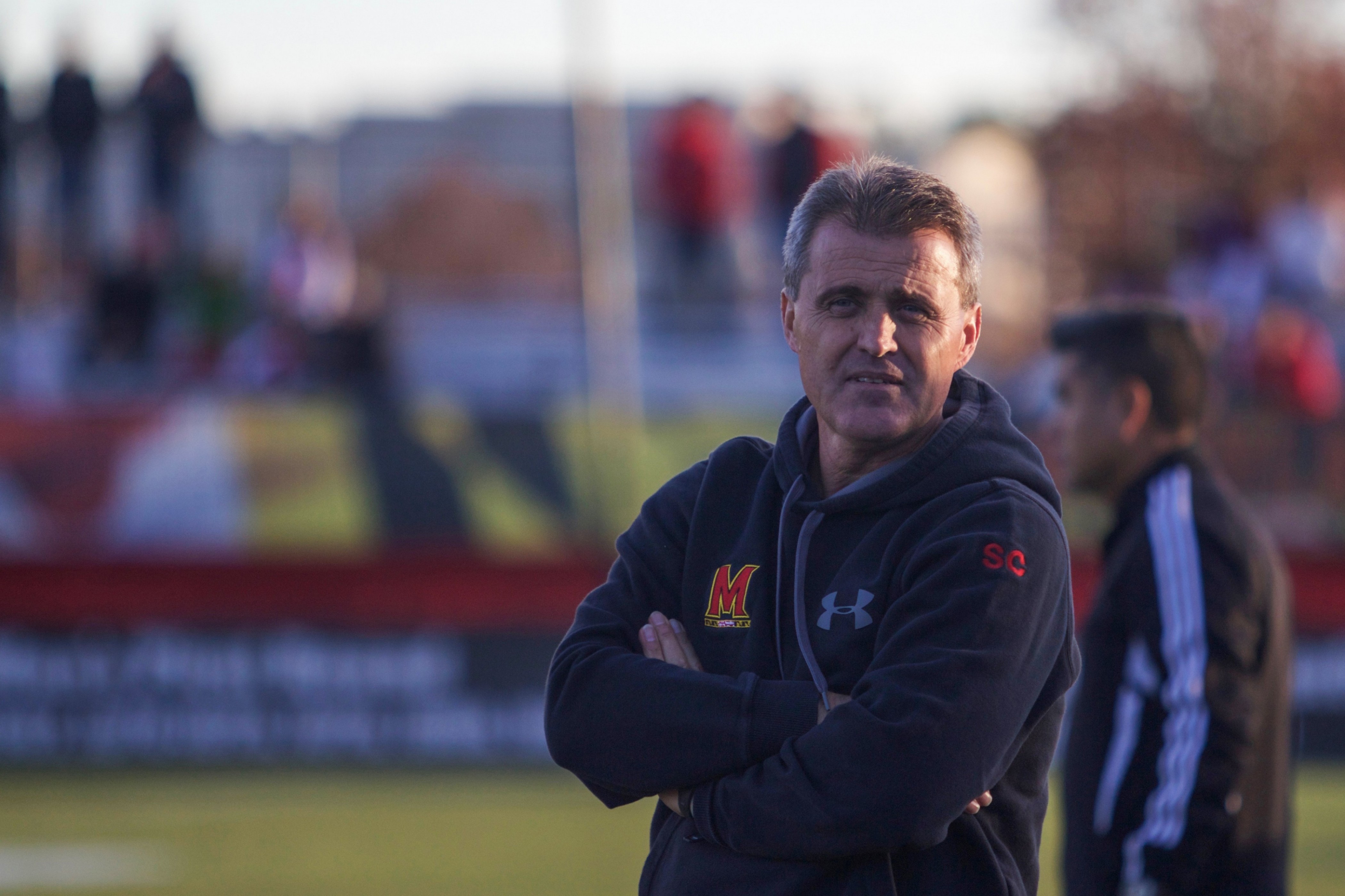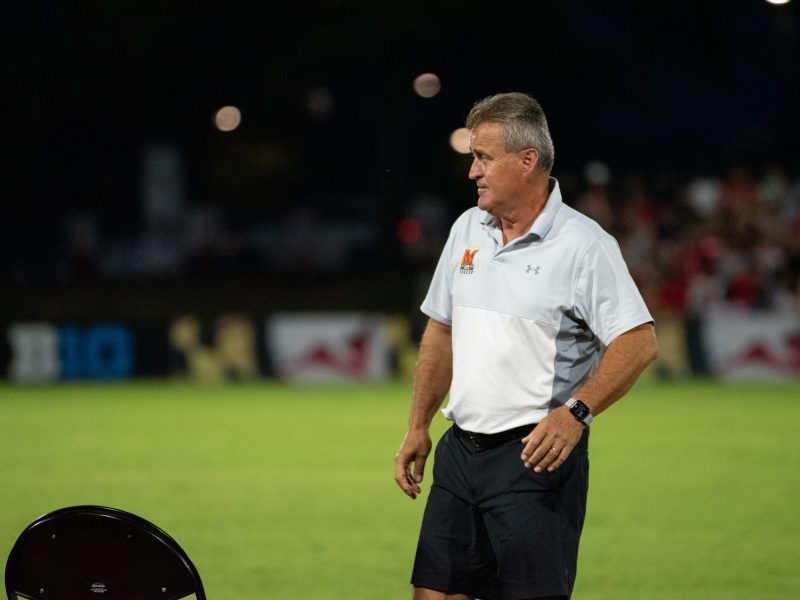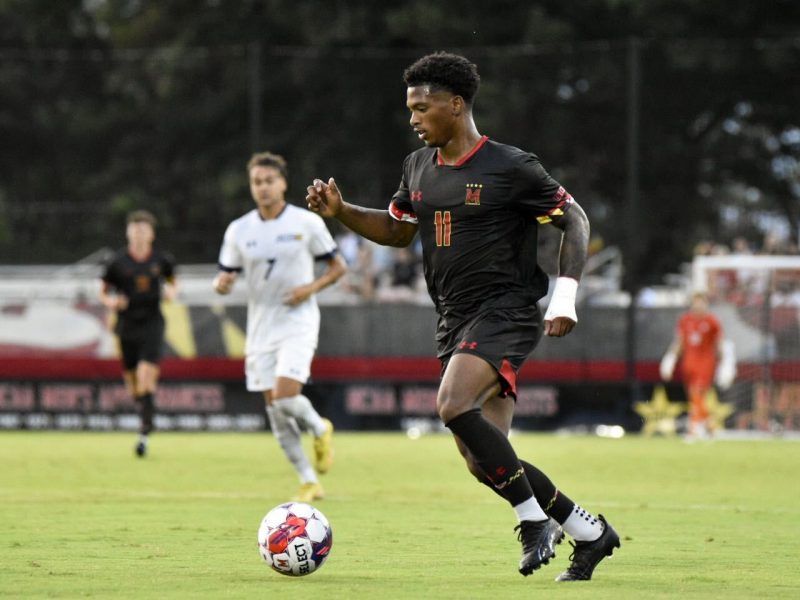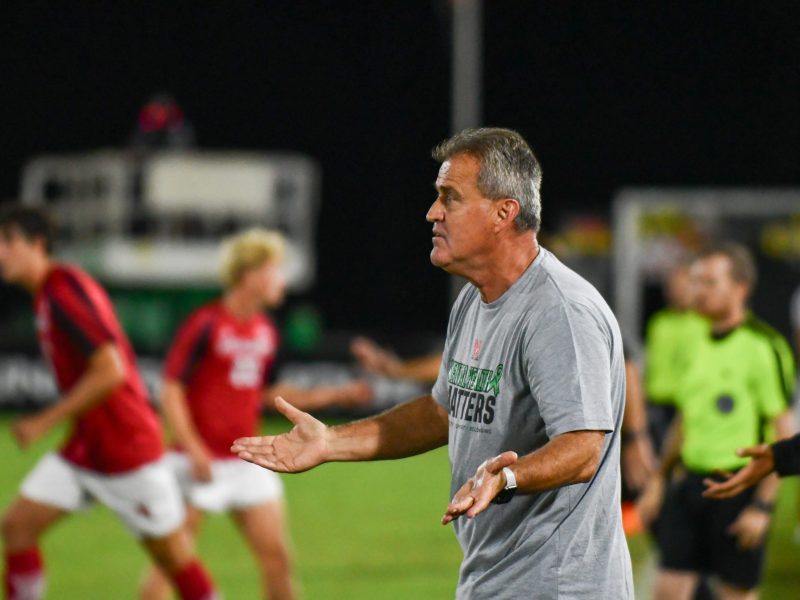By Mike Revollo
For The Diamondback
Born in Macedonia, Sasho Cirovski didn’t have many opportunities to be creative with his childhood athletic endeavors in a country where soccer reigned supreme.
He naturally fell in love playing the game, and when his family moved to Canada when he was 8, he soaked in everything he could while trying various sports under his youth coaches in Windsor, Ontario.
It was then that Cirovski gained an appreciation for a different side of sports, as he depended heavily on his coaches for his development while his parents adjusted to their new life in Canada. His admiration for his teachers and mentors slowly cultivated from learning under a handful of esteemed ones.
The most prominent role model Cirovski has had — albeit far from the only — is former Manchester United manager Sir Alex Ferguson, who led the English team to its most successful period in its existence, winning 38 domestic and international trophies in his 27 years as manager.
But before Ferguson became the legendary coach he’s known as today, he coached Scottish club Aberdeen, where Cirovski played for nearly two months in 1980. He impressed Ferguson enough that he was offered a contract to sign with the club. But Cirovski refused, citing his desire to learn rather than play.
“I turned it down to go to college because I valued my education and it was something that my parents never had a chance to do,” Cirovski said. “I really wanted to get my degree, which I did.”
Cirovski gained another coaching role model while attending the University of Wisconsin-Milwaukee, where he learned under Bob Gansler, who became the men’s soccer coach during Cirovski’s senior year in 1984. In 1989, Gansler would go on to coach the United States men’s national soccer team, helping them qualify for the 1990 FIFA World Cup, the team’s first tournament appearance in 40 years.
“He’s a consummate teacher-coach in American soccer history,” Cirovski said. “He’s someone that I looked at and said, ‘I want to be like him.’”
For Cirovski, mastering the sport under such prominent soccer minds developed into an ambition to become a teacher himself.
Now having polished off his third national championship in his 26th season as head coach of Maryland men’s soccer, Cirovski has made good on those aspirations en route to a storied career at the helm of the Terps, where he’s developed a pipeline from his program to Major League Soccer, seeing 47 of his players selected in the MLS SuperDraft — two of which were No. 1 overall picks.
“Much of the culture we’ve built at Maryland is based on the ideas, principles and values, both on and off the field, of Manchester United during [Ferguson’s] time,” Cirovski said.
Building a powerhouse
In the last 10 years, 28 players have been selected from Maryland — more than any other school in that time span. Four players from Cirovski’s recent 2018 College Cup-winning team were selected in this year’s SuperDraft in January: goalkeeper Dayne St. Clair, Minnesota United, 7th overall; defender Chase Gasper, Minnesota United, 15th overall; defender Andrew Samuels, Houston Dynamo, 33rd overall; midfielder Amar Sejdic, Montreal Impact, 34th overall.
Through harnessing the knowledge of his role models and growing from life experiences, Cirovski has built a winning and nurturing culture with the Terps that ensures his players have strong chances of becoming professional players in MLS.
A prime example of someone who thrived at the next level after playing for Cirovski is Sporting Kansas City midfielder Graham Zusi.
In his time at Maryland, Zusi won the 2005 College Cup as a freshman — Cirovski’s first national championship — as well as the 2008 title as a senior. Since leaving Maryland, Zusi has won an MLS Cup and appeared in every game for the U.S. men’s national team during its most recent World Cup run in 2014.
Zusi believes part of the reason Maryland players have been so successful comes from learning to meet the high standards Cirovski has, paired with him knowing how to coach each of his players.
“Sasho gets the best out of everyone who goes to Maryland,” Zusi said. “There’s so many personalities on the field, but he seems to know how to get the best out of each and every person. It’s also his winning mentality and pursuit of excellence on the field, and off it as well. He doesn’t accept anything other than that.”
Zusi believes Cirovski’s demand for excellence not only improved him as a player, but also as a person.
“I think that my four years at Maryland is probably the place I did the most growing as a man,” Zusi said. “I think Sasho has a lot to do with that.”
‘The software’
Before Cirovski begins to develop players in his program, he needs to know what kind of player and person he’s potentially recruiting. His extensive process includes attending training sessions without a player’s knowledge, talking to opposing players and coaches and observing players’ reactions to certain moments in a game situation.
“I call it the software,” said Cirovski. “It’s easy to see the hardware, but we like to focus on the software of a player. That helps determine how far they can go.”
D.C. United defender Chris Odoi-Atsem was one of the players who caught Cirovski’s eye from a young age, until he finally asked him to join the Terps. Odoi-Atsem would attend Maryland soccer camps in the summer as a kid, wanting to spend time with his friends to have fun, unaware of Cirovski taking note of him. The Prince George’s County native always dreamed of playing at Maryland, but doubted his skillset.
With the faith Cirovski had in him, that reluctance disappeared.
“It probably wasn’t too hard for [Cirovski] to convince me to come, but the fact that a school like that was the first team to really contact me and recruit me that hard,” Odoi-Atsem said. “That made my job pretty easy.”
Once he officially joined the team, Odoi-Atsem quickly discovered the high standards Cirovski has of his players during a preseason training session going into his freshman year.
“I passed the ball over the cone in a passing drill, and Sasho got into me, yelled at me for a little bit,” Odoi-Atsem said. “It’s just those standards probably not a lot of teams and other coaches have, but … it was such a big deal to him that I shouldn’t be doing that.”
He didn’t always have a belief in himself, but is thankful Cirovski did.
“He believed in me making it as a professional player even before I saw it in myself,” said Odoi-Atsem. “I always thank him for that, for pushing me and telling me that I could make it to that level. Without that push, I don’t think I would’ve made it here.”
Cirovski provides players with guidance during their training sessions but asks them to help themselves in their own development. After every session, players spend between 15 and 30 minutes to practice on a skill set specific to their position.
Strikers may work on shooting at goal from different angles while defenders work on ball clearances. With players honing their craft, it builds their individual confidence, thus improving the team overall.
“We’ve created a culture that provides a stage and a platform for them to enjoy themselves, to exhibit their skills and to have a chance to be seen,” Cirovski said. “More importantly, we really instill in them the principles for success in their personal life and team life, to go above and beyond what we can do as coaches in a 90-minute practice.”
Looking out for his players
While most in the soccer stratosphere are familiar with Cirovski’s passionate and demanding nature, he has also developed a reputation of being an outlet to his players off the field.
As someone who had to go across the country to further his education and play soccer, D.C. United goalkeeper Chris Seitz was appreciative of how much his former coach looked out for his players’ well-being.
Seitz left his home in California to attend Maryland, but Cirovski ensured he was able to settle into his new surroundings through commonality and familiarity. Cirovski chose fellow Californian Robbie Rogers as one of Seitz’s roommates, providing him with some familiarity to help him acclimate to the new environment.
The coach’s efforts to accommodate his players didn’t stop there. Some lived too far away to go home for Thanksgiving, so Cirovski would ask families of players who lived closer to take in those who weren’t able to be with their own.
“He has a bunch of kids of his own, but we’re all technically his kids,” Seitz said. “You felt that he was in charge of us, but he also wanted to make sure we’re all doing alright.”
Over time, Cirovski has received interest to coach at the professional level and doesn’t rule out the possibility in the future, but says “it would take a lot for me to leave the University of Maryland.”
Until then, Cirovski will continue serving as a coach and teacher to his players at Maryland, doing just as his coaches in his youth did for him.



